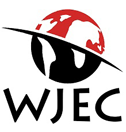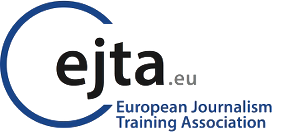Opening
Friday 15.10.2021
12.00 – 12.15 (Moscow time) / 11.00 – 11.15 (Paris time)
Host: Anna Krasavina, associate professor Journalism, advertising and PR Department Institute of Media & Social-humanitarian Sciences SUSU (Russia)
Alexander Shestakov, Rector of SUSU, Doctor of Technical Sciences, Professor, Chairman of Rectors’ Council in Ural Federal District (Chelyabisnk, Russia)
Eric Nahon, PSL (EJTA President, Deputy Director IPJ Dauphine / PSL) (Paris, France)
Guy Berger, Director of Division Freedom of Expression and Media Development, UNESCO
PRESENTATIONS (English)
12.15 – 13.45 (Moscow time) / 11.15 – 12.45 (Paris time)
Moderator Eric Nahon, PSL (EJTA President, Deputy Director IPJ Dauphine / PSL), (Paris, France)
- “The changing functions of journalism and journalism education in the age of social media” – Nico Drok, Deputy Chair WJEC, Counsellor of EJTA, Professor of Media and Civil Society at Windesheim University of Applied Sciences (Windesheim, Netherlands).
- “The new dynamics of journalism education: from classical literature to AI and VR?” – Elena Vartanova, Dean of the Faculty of Journalism at Lomonosov Moscow State University (Moscow), Professor, Doctor of Philology Sciences, Correspondent member of the Russian Education Academy, President of the National Association of Mass Media Researches (NAMMI) (Russia).
- “The importance of fact checking and verification in the era of social media and AI (illustrated by EJTA’s international students’ project EUfactcheck)”. – Nadia Vissers, Director of EJTA, lecturer and coordinator of internationalization in the Bachelor of Journalism at the Artesis Plantijn University College in Antwerp (Belgium).
- Student-journalist and social networks: a search study, Anna Krasavina, associate professor Journalism, advertising and PR Department Institute of Media & Social-humanitarian Sciences SUSU (Russia)
Discussion 30 min
-
Participants: Marina Shilina, Doctor of Philology, professor of Russian Plekhanov University of Economics (Moscow);
-
Marina Zagidullina, Doctor of Philology, professor of Chelyabinsk State University (Chelyabinsk);
-
Evgeny Zagoskin, journalist, Head of the Department of Internet portals and social media of UMKM (Chelyabinsk) and others.
LUNCH BREAK
13.45-14.15 (Moscow time) / 12.45-13.15 (Paris time)
Break-out sessions
14.15 –16.15
Track 1 (English)
14.15-16.15 (Moscow time) – 13.15-15.15 (Paris time)
Moderators: Nico Drok and Nadia Vissers
- Teaching professional values in the era of social networks and artificial intelligence – Maarit Jaakkola, University of Gothenburg (Sweden)
- The influence of Artificial Intelligence on journalism education in a digital society” – Kamilla Nigmatullina, Saint Petersburg State University (Russia)
- Digital storytelling – Ludmila Makarova, National Research Lobachevsky State University of Nizhny Novgorod, (Russia)
- Immersive journalism – Yael de Haan, University of Applied Science Utrecht (Netherlands)
- Journalism and the challenges of the digital divide – Anna Gladkova, Lomonosov Moscow State University (Russia).
Round table discussion (60 minutes), consisting of two parts:
Panel discussion: Journalism education in the era of social networks and artificial intelligence (30 min)
Participants:
- Elena Vartanova, Dean of the Faculty of Journalism of Lomonosov Moscow State University (Russia)
- Maarit Jaakkola, University of Gothenburg (Sweden)
- Kamilla Nigmatullina, Saint Petersburg State University (Russia)
- Maria Anikina, associate professor, candidate of philological sciences, Lomonosov Moscow State University;
- Bela Lebedeva, senior lecturer, St. Petersburg State University (Saint-Petersburg);
- Svetlana Vasilyeva, journalist, head of the ANPO “Territory of Tomorrow” (Nizhny Novgorod);
- Oleg Igoshin, journalist, expert of the Information Projects Department of the ANO “Dialog” (Moscow);
- Ksenia Strugovets, journalist, producer of OTV information programs (Chelyabinsk);
- Olga Mayakova, journalist, manager of corporate media, “Trubnik” Radio station (Chelyabinsk) and others.
Q&A-session (30 min.): Questions from online participants of the conference and Answers of the panel members or the presenters.
Track 2 (Russian)
Moderator: Maria Lukina, Deputy Dean for Educational and Methodological Association of the Faculty of Journalism of Lomonosov Moscow State University, Associate Professor, Candidate of Philological Sciences (Moscow, Russia)
Lyudmila Shesterkina, Doctor of Philology, Professor, Deputy Director of IMSHS, Head of the Department of Journalism, Advertising and Public Relations of SUSU (Chelyabinsk, Russia)
- Digital technologies for training media professionals of the 21st century in the modern educational environment – Olga Lepilkina, Doctor of Philology, Professor, Head of the Department of History and Theory of Journalism, North Caucasus Federal University (Russia)
- Digital storytelling as a technology for teaching the specifics of modern content – Larisa Zhukovskaya, Director of the Institute of Philology and Journalism of the Lobachevsky State University of Nizhny Novgorod, Candidate of Philological Sciences, associate Professor.
- VR journalism: changing professional competencies of a journalist – Oleg Samartsev, Doctor of Philology, Head of the Department of Journalism, Philology, Library Science and Documentation, Ulyanovsk State University, Professor of the Academy of Media Industry (Moscow). Chairman of the Ulyanovsk regional branch of the all-Russian public organization “Union of Journalists of Russia”
- Traditions and innovations in journalistic education –Vladimir Tulupov, Voronezh State University (Voronezh, Russia)
- Big Data Journalism – university’s experience in training data journalists – Ivan Pechishchev, candidate of Philological Sciences, Associate Professor of the Department of Journalism and Mass Communications at Perm State University (Perm, Russia)
- Professional and ethical values of the journalistic community in the era of social networks and artificial intelligence – Vladimir Oleshko, Head of the Department of Periodicals and Online Mass Media of the Journalism Department of the Ural Federal University named after the First President of Russia B. N. Yeltsin, Doctor of Philosophy, Professor (Yekaterinburg)
- Journalism education without social networks: is it possible? – Sergey Ilchenko (St. Petersburg State University (St. Petersburg, Russia), professor of the Department of Television and Radio Journalism, Doctor of Philology, Candidate of Art History
- Discussion Journalism in the era of social networks (30 min)
- Q&A-session (30 min)
Participants:
- Yulia Dolgova, associate professor, candidate of philological sciences, Lomonosov Moscow State University;
- Vladislav Chukhrov, journalist, editor-in-chief of the OTV news editorial office (Chelyabinsk);
- Kuralai Anosova, journalist, editor-in-chief of the newspaper “Magnitogorsk Worker” (Magnitogorsk),
- Arina Marfitsyna, Head of the laboratory “360-degree multimedia newsroom”(Chelyabinsk),
- Maria Bulaeva, lecturer of SUSU (Chelyabinsk) and others.
Track 3 (Russian)
Moderator: Lydia Lobodenko, Director of the Institute of Social and Humanitarian Sciences of SUSU, Doctor of Philology, Professor (Russia) and Svetlana Urazova, Doctor of Philology, Associate Professor, Editor-in-Chief of the scientific journal “Vestnik VGIK”, Academy of Media Industry (Moscow)
- Formation of the media competence of the future journalist in the era of social networks and artificial intelligence – Almatay Zhusupova, Head of the Department of Journalism and Communication Management, Candidate of Philological Sciences, Associate Professor of Kostanay State University named after A. Baitursynov (Kazakhstan)
- The use of artificial intelligence elements in media industry – Maria Krasheninnikova, Senior Lecturer of the Department of New Media and Communication Theory at Lomonosov Moscow State University (Moscow), employee of the Educational and Methodological Department, Chief editor of the student media “Journalist Online”
- Video blogging: ways to generate interest and capture the audience’s attention – Alla Shesterina, Professor of the Department of Electronic Media and Speech Communication, Voronezh State University, Doctor of Philology (Russia)
- Neuromarketing research in journalism and media space – Lydia Lobodenko, Director of the Institute of Social and Humanitarian Sciences of SUSU, Doctor of Philology, Professor (Russia), Anna Cherednyakova, associate professor Journalism, advertising and PR Department Institute of Media & Social-humanitarian Sciences SUSU (Russia)
- Ethnic Journalism and the Challenges of the Digital Age – Nikita Argylov, Director of the Department of Communications and Media, Candidate of Political Sciences, Associate Professor, Far Eastern Federal University (Vladivostok, Russia)
- Study of media text using digital methods-Tatiana Semyan, Head of the Department of Russian Language and Literature, Professor, Evgeny Smyshlyaev, associate Professor of Journalism, Advertising and Public Relations, South Ural State University (Chelyabinsk, Russia )
- Discussion Journalism in the era of social networks (30 min)
Participants:
- Irina Volkova, professor, Doctor of philology of the RUDN University (Moscow);
- Irina Erofeeva, professor, Doctor of philology of ZabGU (Chita);
- Natalia Balynskaya, Director of the IEU of the Moscow State Technical University named after G. I. Nosov, Doctor of political sciences (Magnitogorsk);
- Olga Perevozova, associate professor, Candidate of Pedagogical Sciences of SUSU (Chelyabinsk);
- Elena Davletshina, Head of the Department of Media Communications and Monitoring (Chelyabinsk) and others.
- Q&A-session (30 min)
CLOSING CEREMONY
16.15-17.00 (Moscow time)/ 15.15-16.00 (Paris time)
Moderators – Niko Drok, Nadia Vissers, Maria Lukina.
All registered participants of the Round table will receive a UNESCO/WJEC/EJTA/SUSU Certificate of participation.
It is planned to publish a Roundtable proceedings in pdf format.





